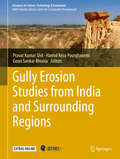- Table View
- List View
Gully Erosion Studies from India and Surrounding Regions (Advances in Science, Technology & Innovation)
by Hamid Reza Pourghasemi Gouri Sankar Bhunia Pravat Kumar ShitThis book offers the scientific basis for the ample evaluation of badland management in India and some surrounding regions. It examines the processes operating in the headwaters and main channels of ephemeral rivers in lateritic environments of India. In particular, the book covers a range of vital topics in the areas of gully erosion and water to soil erosion at lateritic uplands regions of India and other regions in Asia. It explores the probable gully erosion modeling through Remote Sensing & GIS Techniques. It is divided into three units. Unit I deals with the introduction of badland, types of badland and the process of badland formation. Unit II is devoted to a description of quantitative measurements. Unit III deals with the control and management processes related to various issues from different regions. As such this book serves as a reference book for research activities in this area. It is an efficient guide for aspiring researchers in applied geography, explaining advanced techniques to help students recognize both simple and complex concepts.
Gum Karaya: Botany, Gum Tapping, Applications, and Biotechnology
by Mallappa Kumara Swamy T. Pullaiah Lepakshi Md. Bhakshu Niranjan PrasadPolysaccharide gums have a wide range of applications due to their hydrophilic properties. They have been used as a gelling agent, encapsulating agent, thickener, emulsifier, and stabilizer. Sourcing natural gums from botanical and plant sources has become an important focus in producing acceptable food ingredients in liquids and semi-solid forms. This is mainly because of the positive attitude of consumers toward plant-based gums rather than other gums from animal and microbial sources.Gum karaya, also known as Indian tragacanth, is a vegetable gum produced as an exudate by trees of the genus Sterculia. Gum karaya has very strong swelling properties, high viscosity, and very poor solubility because of its acetyl groups. Therefore, it is mainly used in cosmetics and pharmaceuticals. Gum karaya is one of the least-soluble gums used for many industries, such as petroleum and gas, textile, paper and pulp, leather and allied products, ammunition and explosives, electrical appliances, adhesives, confectionery, medicine, pharmaceuticals, and cosmetics.Because of the crude tapping method and overexploitation, the population of karaya trees has markedly declined. In the absence of cultivation of this tree on the regular plantation, there is grave concern about the loss of wild germplasm of S. aurens. As gum karaya is vital for the tribal economy and its trade value is substantial, there is a pressing need to develop a scientific and sustainable tapping method to increase the yield and ensure the survival of the tapped trees. There is also a need for a large-scale plantation of gum karaya. People are becoming health-conscious and are taking natural products as food ingredients. This book will be useful to all the people interested in natural food additives. This book gives the details of gum karaya–yielding species and their distribution. Scientific methods of gum tapping are given for sustainable gum production. Propagation methods, both field and in vitro, are given. Uses of gum karaya, in cosmetics, pharmaceuticals, and food, are given. Genetic diversity and biotechnological intervention for the improvement of gum karaya–yielding species are included. Threats and conservation of gum karaya–yielding species are given.
Gumshoe Gang Cracks The Case (Rourke's Mystery Chapter)
by Kyla SteinkrausIn Gumshoe Gang Cracks the Case, readers will help discover who destroyed Alex's science project before the Science Fair happens. Rourke's Mystery Chapter Books introduce intermediate students to the genre of mystery. Each 64-page title offers a different mystery that students solve through clues about the setting and characters. With longer text, few illustrations, and a more complex story structure, students strengthen reading comprehension skills all while having fun.
Gun Digest Big Fat Book of the .45 ACP
by Patrick SweeneyEverything you've ever wanted to know about America's favorite handgun cartridge! Designed nearly a century ago, the .45 ACP cartridge has earned a well-deserved reputation as a superbly accurate, slap-em-down handgun cartridge. An honored veteran of two World Wars, Korea, Vietnam and lesser conflicts across the globe, the .45 ACP is now more popular than ever for competition shooting, law enforcement and self-defense. Now, just in time for the .45 ACPs 100th anniversary, handgun expert Pat Sweeney gives us the inside scoop on America's favorite big-bore cartridge. If you own a handgun or carbine chambered for the big .45, or if you're considering buying on, you'll find everything you need in the Gun Digest Big Fat Book of the .45 ACP. It's all here: The origins of the .45 ACP and the guns that use it Reloading tips, tricks and techniques The inside story of .45 ACP cases, bullets, primers and powder And so much more! It's the best one-volume guide to the most popular big-bore handgun cartridge of all time!
Gun Digest Colt Python Assembly/Disassembly Instructions
by J. B. WoodThis short e-book teaches you how to take apart and reassemble your Colt Python with confidence. Thanks to clear Assembly/Disassembly instructions and crisp photography - aided by gun expert J.B. Wood's sage advice - you'll save an expensive trip to the gunsmith by getting to know your gun inside and out!
Gun Trader's Guide - Forty-Fifth Edition: A Comprehensive, Fully Illustrated Guide to Modern Collectible Firearms with Market Values
by Robert A. SadowskiIf you are seeking a comprehensive reference for collectible gun values, the Gun Trader&’s Guide is the only book you need. Included are extensive listings for handguns, shotguns, and rifles from some of the most popular manufacturers, including Beretta, Browning, Colt, Remington, Savage, Smith & Wesson, Winchester, and many more. The Gun Trader's Guide is a one-stop manual to buying collectible firearms. For more than half a century, this guide has been the standard reference for collectors, curators, dealers, shooters, and gun enthusiasts. Updated annually, it remains the definitive source for making informed decisions on used firearms purchases.
Gun Trader's Guide - Forty-Fourth Edition: A Comprehensive, Fully Illustrated Guide to Modern Collectible Firearms with Market Values
by Robert A. SadowskiIf you are seeking a comprehensive reference for collectible gun values, the Gun Trader&’s Guide is the only book you need. Included are extensive listings for handguns, shotguns, and rifles from some of the most popular manufacturers, including Beretta, Browning, Colt, Remington, Savage, Smith & Wesson, Winchester, and many more. The Gun Trader's Guide is a one-stop manual to buying collectible firearms. For more than half a century, this guide has been the standard reference for collectors, curators, dealers, shooters, and gun enthusiasts. Updated annually, it remains the definitive source for making informed decisions on used firearms purchases.
Gun Trader's Guide Thirty-Sixth Edition: A Comprehensive, Fully Illustrated Guide to Modern Collectible Firearms with Current Market Values
by Robert A. SadowskiIf you are seeking a comprehensive reference for collectible gun values, the Gun Trader’s Guide is the only book you need. For more than half a century, this guide has been the standard reference for collectors, curators, dealers, shooters, and gun enthusiasts. Updated annually, it remains the definitive source for making informed decisions on used firearms purchases. Included are extensive listings for handguns, shotguns, and rifles from some of the most popular manufacturers, including Beretta, Browning, Colt, Remington, Savage, Smith & Wesson, Winchester, and many more.This thirty-sixth edition boasts dozens of new entries since last year’s edition and includes a complete index and a guide on how to properly and effectively use this book in order to find the market value for your collectible modern firearm. Determine the new in box, excellent, and good condition prices for any firearm you want to sell or trade. With new introductory materials that every gun collector and potential buyer should read, this book is the ultimate guide to purchasing classic or discontinued firearms. No matter what kind of modern collectible firearm you own or collect, the Gun Trader’s Guide should remain close at hand.Skyhorse Publishing is proud to publish a broad range of books for hunters and firearms enthusiasts. We publish books about shotguns, rifles, handguns, target shooting, gun collecting, self-defense, archery, ammunition, knives, gunsmithing, gun repair, and wilderness survival. We publish books on deer hunting, big game hunting, small game hunting, wing shooting, turkey hunting, deer stands, duck blinds, bowhunting, wing shooting, hunting dogs, and more. While not every title we publish becomes a New York Times bestseller or a national bestseller, we are committed to publishing books on subjects that are sometimes overlooked by other publishers and to authors whose work might not otherwise find a home.
Gun Trader's Guide to Handguns: A Comprehensive, Fully Illustrated Reference for Modern Handguns with Current Market Values
by Robert A. SadowskiGun Trader’s Guide is the bestselling collectible firearms reference, having sold over two million copies in thirty-eight editions. The guide includes prices for all types of firearms, but what if you are only interested in buying, selling, and collecting handguns? Then Gun Trader’s Guide to Handguns is the book for you! Featuring all your favorite handguns from the original Gun Trader’s Guide, plus hundreds more, this is the only reference you’ll ever need. Veteran editor and firearms enthusiast Robert A. Sadowski has compiled and cataloged discontinued and collectible handguns from your favorite manufacturers. Complete with specs and price gradients based on the condition of the handgun, collecting and selling your firearms will be easier than ever. Sadowski also provides valuable tips on how to use the guide, as well as articles on various collectible handguns and the art of handgun trading. Also step behind the scenes to learn what dealers are looking for, what they want in your handgun, and what’s required to become a dealer, which should help you when buying, trading, or selling your handguns. Whether you are a first-time handgun owner or a longtime handgun enthusiast, Gun Trader’s Guide to Handguns is an invaluable tool to read before stepping foot in the dealer’s store or attending a gun show.
Gun Trader's Guide, Fortieth Edition: A Comprehensive, Fully Illustrated Guide to Modern Collectible Firearms with Current Market Values (Gun Trader's Guide Ser.)
by Robert A. SadowskiIf you are seeking a comprehensive reference for collectible gun values, the Gun Trader’s Guide is the only book you need. For more than half a century, this guide has been the standard reference for collectors, curators, dealers, shooters, and gun enthusiasts. Updated annually, it remains the definitive source for making informed decisions on used firearms purchases. Included are extensive listings for handguns, shotguns, and rifles from some of the most popular manufacturers, including Beretta, Browning, Colt, Remington, Savage, Smith & Wesson, Winchester, and many more. This fortieth edition boasts dozens of new entries since last year’s edition and includes a complete index and a guide on how to properly and effectively use this book in order to find the market value for your collectible modern firearm. Determine the new prices for any firearm you want to sell or trade, whether its condition is in-box, excellent, or good. With new introductory materials that every gun collector and potential buyer should read, this book is the ultimate guide to purchasing classic or discontinued firearms. No matter what kind of modern firearm you own or collect, the Gun Trader’s Guide should remain close at hand.
Gun Trader's Guide, Forty-First Edition: A Comprehensive, Fully Illustrated Guide to Modern Collectible Firearms with Current Market Values (Gun Trader's Guide)
by Robert A. SadowskiThe one-stop guide to buying collectible firearms, with more than two million copies sold! If you are seeking a comprehensive reference for collectible gun values, the Gun Trader’s Guide is the only book you need. For more than half a century, this guide has been the standard reference for collectors, curators, dealers, shooters, and gun enthusiasts. Updated annually, it remains the definitive source for making informed decisions on used firearms purchases. Included are extensive listings for handguns, shotguns, and rifles from some of the most popular manufacturers, including Beretta, Browning, Colt, Remington, Savage, Smith & Wesson, Winchester, and many more. This forty-first edition boasts dozens of new entries since last year’s edition and includes a complete index and a guide on how to properly and effectively use this book in order to find the market value for your collectible modern firearm. Determine the new prices for any firearm you want to sell or trade, whether its condition is in-box, excellent, or good. With new introductory materials that every gun collector and potential buyer should read, this book is the ultimate guide to purchasing classic or discontinued firearms. No matter what kind of modern firearm you own or collect, the Gun Trader’s Guide should remain close at hand.
Gun Trader's Guide, Forty-Second Edition: A Comprehensive, Fully Illustrated Guide to Modern Collectible Firearms with Current Market Values (Gun Trader's Guide)
by Robert A. SadowskiIf you are seeking a comprehensive reference for collectible gun values, the Gun Trader&’s Guide is the only book you need. Included are extensive listings for handguns, shotguns, and rifles from some of the most popular manufacturers, including Beretta, Browning, Colt, Remington, Savage, Smith & Wesson, Winchester, and many more. The Gun Trader's Guide is a one-stop manual to buying collectible firearms. For more than half a century, this guide has been the standard reference for collectors, curators, dealers, shooters, and gun enthusiasts. Updated annually, it remains the definitive source for making informed decisions on used firearms purchases. With more than two million copies sold and in its forty-second edition, this updated Gun Trader&’s Guide boasts dozens of new entries and includes a complete index and a guide on how to properly and effectively use this book in order to find the market value for your collectible modern firearm. Determine the new prices for any firearm you want to sell or trade, whether its condition is in-box, excellent, or good. With new introductory materials that every gun collector and potential buyer should read, this book is the ultimate guide to purchasing classic or discontinued firearms. No matter what kind of modern firearm you own or collect, the Gun Trader&’s Guide should remain close at hand.
Gun Trader's Guide, Thirty-Eighth Edition: A Comprehensive, Fully Illustrated Guide to Modern Collectible Firearms with Current Market Values
by Robert A. SadowskiIf you are seeking a comprehensive reference for collectible gun values, the Gun Trader's Guide is the only book you need. For more than half a century, this guide has been the standard reference for collectors, curators, dealers, shooters, and gun enthusiasts. Updated annually, it remains the definitive source for making informed decisions on used firearms purchases. Included are extensive listings for handguns, shotguns, and rifles from some of the most popular manufacturers, including Beretta, Browning, Colt, Remington, Savage, Smith & Wesson, Winchester, and many more.This thirty-eighth edition boasts dozens of new entries since last year's edition and includes a complete index and a guide on how to properly and effectively use this book in order to find the market value for your collectible modern firearm. Determine the new prices for any firearm you want to sell or trade, whether its condition is in box, excellent, or good. With new introductory materials that every gun collector and potential buyer should read, this book is the ultimate guide to purchasing classic or discontinued firearms. No matter what kind of modern firearm you own or collect, the Gun Trader's Guide should remain close at hand.Skyhorse Publishing is proud to publish a broad range of books for hunters and firearms enthusiasts. We publish books about shotguns, rifles, handguns, target shooting, gun collecting, self-defense, archery, ammunition, knives, gunsmithing, gun repair, and wilderness survival. We publish books on deer hunting, big game hunting, small game hunting, wing shooting, turkey hunting, deer stands, duck blinds, bowhunting, wing shooting, hunting dogs, and more. While not every title we publish becomes a New York Times bestseller or a national bestseller, we are committed to publishing books on subjects that are sometimes overlooked by other publishers and to authors whose work might not otherwise find a home.
Gun Trader's Guide, Thirty-Ninth Edition: A Comprehensive, Fully Illustrated Guide to Modern Collectible Firearms with Current Market Values (Gun Trader's Guide)
by Robert A. SadowskiIf you are seeking a comprehensive reference for collectible gun values, the Gun Trader’s Guide is the only book you need. For more than half a century, this guide has been the standard reference for collectors, curators, dealers, shooters, and gun enthusiasts. Updated annually, it remains the definitive source for making informed decisions on used firearms purchases. Included are extensive listings for handguns, shotguns, and rifles from some of the most popular manufacturers, including Beretta, Browning, Colt, Remington, Savage, Smith & Wesson, Winchester, and many more. This thirty-ninth edition boasts dozens of new entries since last year’s edition and includes a complete index and a guide on how to properly and effectively use this book in order to find the market value for your collectible modern firearm. Determine the new prices for any firearm you want to sell or trade, whether its condition is in box, excellent, or good. With new introductory materials that every gun collector and potential buyer should read, this book is the ultimate guide to purchasing classic or discontinued firearms. No matter what kind of modern firearm you own or collect, the Gun Trader’s Guide should remain close at hand.
Gunflint Falling: Blowdown in the Boundary Waters
by Cary J. GriffithStories from survivors of the Boundary Waters Canoe Area Wilderness&’s epochal weather disaster On July 4, 1999, in the Boundary Waters Canoe Area Wilderness (BWCAW), a bizarre confluence of meteorological events resulted in the most damaging blowdown in the region&’s history. Originating over the Dakotas, the midsummer windstorm developed amid unusually high heat and water-saturated forests and moved steadily east, bearing down on Fargo, North Dakota, and damaging land as it crossed the Minnesota border. Gunflint Falling tells the story of this devastating storm from the perspectives of those who were on the ground before, during, and after the catastrophic event—from first-time visitors to the north woods to returning paddlers to Forest Service Rangers. The pre-dawn forecasts from the National Weather Service in Duluth for that Sunday of the holiday weekend predicted the day would be &“warm and humid. Partly sunny with a thirty percent chance of thunderstorms.&” But as the afternoon and evening settled over the Boundary Waters, the first eyewitness accounts began to tell a dramatic and terrifying story. Five friends camping on Lake Polly watched in wonder as the sky turned green and the winds began to whip. They scrambled to pull canoes on shore and secure tarps when a tree snapped and struck one of them in the head, rendering her unconscious. Three women enjoying their last day of a camping trip near the end of the Gunflint Trail took shelter in their tent as winds increased. Water drenched the nylon walls as trees crashed around them, one flattening the tent and pinning a woman beneath its weight. A family vacationing at their cabin dodged falling trees and strained against straight-line winds as they sprinted from the cabin to the safest place they knew: a crawl space underneath it. They watched in awe as trees snapped and toppled, their twisted root balls torn out of the water-logged earth—as they prayed their cabin would hold. By the time the storm began to subside, falling trees had injured approximately sixty people, and most needed to be medevacked to safety. Amazingly, no one died. The historic storm laid down timber that would later blaze in the Ham Lake fire of 2007, ultimately reshaping the region&’s forests in ways we have yet to fully understand.
Gunny's Rules: How to Get Squared Away Like a Marine
by R. Lee ErmeyPut down your sissy drink with its umbrella, get off your backside, and square yourself away. Get fit, get a job, and get yourself some self-respect. America's favorite, most in-your-face sarge is going to show you how to get squared away like a Marine.R. Lee "Gunny" Ermey, of The History Channel's Mail Call, takes time out from telling viewers all about military technology, to tell readers all about life. Men today are facing a crisis of emasculation. Gunny is here to tell you how to fight back and save your dignity: by taking control of your own damn life. First, he teaches you how to get fit, stay fit, and defend yourself. Then, he teaches you how to conduct yourself the way real men do: with assertiveness but also with wisdom and courtesy. Finally, Gunny motivates you to use your new fitness and new attitude to live life like a man of honor: to work hard, reach for high goals, and set an example with your life.Gunny's Rules is the ultimate guide for anyone who wants to live life like one of the toughest of the tough--like a Marine.
Guns & Ammo Guide to AK-47s: A Comprehensive Guide to Shooting, Accessorizing, and Maintaining the Most Popular Firearm in the World
by Eric R Poole Editors of Guns AmmoEverything you need to know about AK-47s from top firearms writers. The Guns & Ammo Guide to AK-47s is packed with a wealth of valuable information compiled by the foremost firearms writers today. Discover tried and true tips, tactics, and techniques from the pros along with guidance on buying gear and firearms from experts including Tom Beckstrand, Jeremy Stafford, David M. Fortier, Jack Lott, and Eric R. Poole. The Guns & Ammo Guide to AK-47s has everything you could want to learn about AK-47s.
Guns & Ammo Guide to AR-15s: A Comprehensive Guide to Black Guns
by Eric R Poole Editors of Guns AmmoEverything you need to know about AR-15s from top firearms writers.The Guns & Ammo Guide to AR-15s is packed with a wealth of valuable information compiled by the foremost firearms writers today. Discover tried and true tips, tactics, and techniques from the pros along with guidance on buying gear and firearms from experts including Patrick Sweeney, David Faubion, SGM Kyle Lamb, Tom Beckstrand, and Eric R. Poole. The Guns & Ammo Guide to AR-15s has everything you could want to learn about AR-15s.
Guns & Ammo Guide to Concealed Carry: A Comprehensive Guide to Carrying a Personal Defense Firearm
by Eric R Poole Editors of Guns AmmoEverything you need to know about concealed carry from top firearms writers. The Guns & Ammo Guide to Concealed Carry is packed with a wealth of valuable information compiled by the foremost firearms writers today. Discover tried and true tips, tactics, and techniques from the pros along with guidance on buying gear and firearms from experts including Massad Ayoob, Jason Teague, Tom Beckstrand, and Richard Nance. The Guns & Ammo Guide to Concealed Carry has everything you could want to learn about personal defense firearms.
Guns & Ammo Guide to Sniping: A Comprehensive Guide to Guns, Gear, and Skills
by Editors of Guns AmmoEverything you need to know about sniping from the top firearms writers. The Guns & Ammo Guide to Sniping is packed with a wealth of valuable information compiled by the foremost firearms writers today. Discover tried and true tips, tactics, and techniques from the pros along with guidance on buying gear and firearms from experts including Caylen E. Wojcik, Tom Beckstrand, Todd Hodnett, and Jeff Hoffman. The Guns & Ammo Guide to Sniping has everything you need to know about sniping!
Gunsmithing Modern Firearms: A Gun Guy's Guide to Making Good Guns Even Better
by Bryce M. TowsleyOne of America's foremost experts on gunsmithing, Bryce Towsley is back again to provide even more projects for anyone interested in building, customizing, or maintaining firearms. He offers detailed explanations and includes color illustrations for just about every aspect of gun modification and repair. Featured tutorials include: stock modifications, accuracy enhancement, weather preparation, a total rifle makeover, and much more. Beginning with shop design and maintenance, Towsley builds on the knowledge he provides until ending with directions on rifle building from scratch. For anyone interested in fixing or building guns, Towsley’s new book is the best guide to getting the most out of a rifle through personal modifications.“My experience working with Skyhorse is always a positive collaboration. The editors are first-rate professionals, and my books receive top-shelf treatment. I truly appreciate our working relationship and hope it continues for years to come.” –David Fischer, author
Gus and Grandpa Go Fishing
by Claudia MillsFrom the book Gus goes fishing for the first time. Mommy can't help him because she doesn't fish, and Daddy is completely absorbed in his fancy new fishing gear. Fortunately, Grandpa is there. Grandpa shows Gus how to cast, but Gus gets all tangled up in the line. When he masters casting and lands the lure in the water, nothing bites. Finally he feels something - it gets away. "I want to catch a fish," Gus tells Grandpa. "Keep trying," says Grandpa. "We know they're out there." As always, Grandpa gently points Gus in the right direction and Gus finds the way in yet another story, illustrated with watercolor paintings that "reflect the sunny warmth of loving connections passed across generations" (Booklist) This is the ninth book in the Gus and Grandpa series.
Guyku: A Year of Haiku for Boys
by Bob Raczka Peter H. ReynoldsBoy-centric haiku about outdoor fun throughout the seasons, with illustrations by the New York Times bestselling creator Peter Reynolds.The wind and I play tug-of-war with my new kite. The wind is winning. When you’re a guy, nature is one big playground—no matter what the season. There are puddles to splash through in the spring, pine trees to climb in the summer, maple seeds to catch in the fall, and icicles to sword fight with in the winter. Nature also has a way of making a guy appreciate important stuff—like how many rocks it takes to dam up a stream, or how much snow equals a day off from school. So what kind of poetry best captures these special moments, at a length that lets guys get right back to tree climbing and kite flying? Why, guyku, of course!
Guía de principiantes para Mano hecha en casa Recetas Desinfectantes: Recetas rápidas y fáciles para hacer tu Desinfectante de manos casero natural
by Jane AlbertEl desinfectante de manos commercial se está volviendo caro, y con la escasez de desinfectantes debido al COVID-19, es posible que debas recurrir a hacer el tuyo. Hacer tu propio desinfectante de manos es un proceso simple que resulta en una fórmula que puedes personalizar para satisfacer tus propios gustos. Los CCE (Centros de Control de Enfermedades) recomiendan lavarse las manos durante al menos 20 segundos varias veces al día, pero la realidad de la vida puede interponerse (en el camino, en un avión, tren o metro, entiendes el punto), y eso es cuando un desinfectante de manos es necesario. Si bien hay varias versiones de desinfectantes de manos sin alcohol en el mercado, los CCE recomiendan uno que contenga al menos 60% de alcohol para una máxima eficacia, y todos se venden en tiendas locales (al menos en Los Angeles) o por 10-20 veces su precio normal. Algnos desinfectantes de manos comerciales contienen ingredientes tan temibles como los gérmes de los que nos protegen, entonces, ¿por qué no hacer tu propio desinfectante de manos con los ingredientes que selecciones en unos pocos sencillos pasos? Aquí tienes una vista de lo que aprenderás: •Asuntos de Seguridad de los Desinfectantes para Manos •Efectividad de los Desinfectantes de Manos •Varias Recetas de Desinfectantes de Manos Caseros •Receta de la Organizacion Mundial de la Salud (OMS) para crearlo a base de alcohol para frotar •Como hacer Gel de Aloe Vera •Técnica Correcta de Lavado de Manos •Consejos del Uso Mas Eficiente de Desinfectante de Manos •!Y mucho más! Desplazate hacia arriba y haz click en el botón de "Comprar Ahora con 1-Click" para obtener tu copia !ya!
























